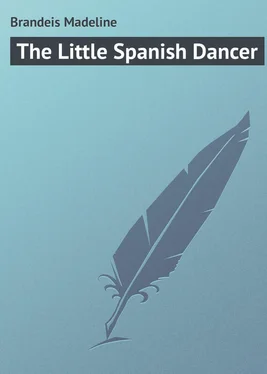Madeline Brandeis - The Little Spanish Dancer
Здесь есть возможность читать онлайн «Madeline Brandeis - The Little Spanish Dancer» — ознакомительный отрывок электронной книги совершенно бесплатно, а после прочтения отрывка купить полную версию. В некоторых случаях можно слушать аудио, скачать через торрент в формате fb2 и присутствует краткое содержание. Жанр: foreign_prose, foreign_children, на английском языке. Описание произведения, (предисловие) а так же отзывы посетителей доступны на портале библиотеки ЛибКат.
- Название:The Little Spanish Dancer
- Автор:
- Жанр:
- Год:неизвестен
- ISBN:нет данных
- Рейтинг книги:5 / 5. Голосов: 1
-
Избранное:Добавить в избранное
- Отзывы:
-
Ваша оценка:
- 100
- 1
- 2
- 3
- 4
- 5
The Little Spanish Dancer: краткое содержание, описание и аннотация
Предлагаем к чтению аннотацию, описание, краткое содержание или предисловие (зависит от того, что написал сам автор книги «The Little Spanish Dancer»). Если вы не нашли необходимую информацию о книге — напишите в комментариях, мы постараемся отыскать её.
The Little Spanish Dancer — читать онлайн ознакомительный отрывок
Ниже представлен текст книги, разбитый по страницам. Система сохранения места последней прочитанной страницы, позволяет с удобством читать онлайн бесплатно книгу «The Little Spanish Dancer», без необходимости каждый раз заново искать на чём Вы остановились. Поставьте закладку, и сможете в любой момент перейти на страницу, на которой закончили чтение.
Интервал:
Закладка:
Madeline Brandeis
The Little Spanish Dancer
CHAPTER I
THE MAGIC CASTANETS
Pilar was dancing in the Murillo (mū̍-rĭl´ō) Garden. It was a beautiful public garden named after the great Spanish painter, Murillo, who died in a house near by.
Pilar had been born ten years ago in this old city of Seville (sē̍-vĭl´). If you had asked Pilar, "Where is New York?" she would doubtless have laughed with her lovely dark eyes and inquired, "Is it in Seville?" Because, to Pilar, as to most of her friends, there was only one world, and that world was Seville.
Now a terrible thing was happening at Pilar's home this evening. But Pilar did not know it because she was dancing in the garden. Every night, after her grandfather went to bed, she ran off and danced with her friends to the music of a hurdy-gurdy.
But tonight, after Pilar had left, her grandfather had been taken very ill. The neighbors had sent for a doctor, who shook his head gravely over the poor old man.
Pilar knew nothing about this as she clicked her castanets and whirled about in the dance they call the Sevillana.
She was one of the best dancers in her group. And why not? Her mother had been a dancer; her grandmother, too, yes, and her great-grandmother and her great-great – oh, ever so many great-grandmothers! They had all been dancers.
Pilar's parents had died when she was a baby. She lived alone with her grandfather, and they struggled to keep the wolf named Hunger from their door. Her grandfather was a shoemaker, but he worked slowly these days because his hands were old.
Once when Pilar was very little, someone had asked her what pleasures she enjoyed most. She had answered, "The pleasures I enjoy most are – dancing!"
Now this could easily be the answer of every little girl in southern Spain. For while Italy sings, France designs, and Switzerland skates, Spain dances. Why, it is even possible that little girls in Seville would rather dance than go to moving picture shows!
Yet everyone in Seville does not feel that way, for the many open air theaters all over the city are crowded. And what the people seem to like best are the American comedies.
It was growing late, but Pilar seldom went to bed before midnight. She would have told you that evening was the time to live and to laugh and to dance. Then it was cool, while during the day the sun beat down cruelly and people slept for hours.
Through the narrow streets Pilar made her way home at last. She heard little snatches of song from the throats of strollers.
Everyone strolls in Seville; there is no hurry. Nearly everyone sings; there is no worry. Hurry and worry are as much out of place in this city as a woman's hat shop. For white flowers and black lace shawls take the place of hats in Seville.
Pilar hummed to herself as she walked along. Some day she would grow up to be a great dancer like her mother and —
What was that? A light in her house? She looked through the window and saw the doctor bending over her grandfather's bed.
Pilar caught her breath. Then she rushed indoors and ran straight to her grandfather's bedside. Sinking down on her knees, she burst into tears.
"Oh, Grandfather!" she cried. "You are ill! Dear Grandfather, what is the matter?"
The doctor smoothed her soft, black hair and raised her to her feet.
"There, now, my child," he said. "You must not cry. You will only make your grandfather worse. He will get well if you will do what I tell you."
"What – what is that, doctor?" Poor Pilar was trembling.
"You must buy and cook good, nourishing food for him," said the doctor. "And give him the medicines which I order."
Now Pilar's eyes were full of terror. "But, oh, doctor," she cried. "I cannot do that. We have no money."
"No money?" The doctor looked at her pityingly.
"We live by what Grandfather makes when he can work," said Pilar. "Now that he cannot work, there will be no money."
The doctor said, "Um-m" and stroked his beard. Then he asked, "Have you nothing which you might sell?"
"Only – " And Pilar gazed into her tiny cubbyhole of a room next door. "Only an old wooden chest filled with souvenirs, left to me by my mother." She added in a whisper, "I could not sell them!"
The doctor was silent for a moment. Then he said, "I am afraid you must sell them, Pilar, if you wish your grandfather to live."
When the doctor was gone, Pilar went into her room and looked at the precious wooden chest. In it were the souvenirs which her mother had collected throughout her interesting life as a dancer.
The doctor had given her grandfather medicine, and now he slept. But what would happen in the morning?
Pilar shuddered. She was only a little girl, and she was afraid. The doctor had said that her grandfather must have the best of everything, or maybe he would die.
A tear splashed down upon the old, carved chest. There was only one thing to do. Tomorrow she would go into town and sell one of her mother's souvenirs so that she might buy medicine and food.
She brushed away the tears and began to look through her treasures. There were a tall, graceful comb; a faded, but elegant fan; a richly decorated old bonnet; oh, such lovely things! How could she ever part with them?
She pulled out a pair of castanets (kăs´-tȧ-nĕts´). Now, in Spain, it seems that every baby is born with a pair of castanets in its hand. Of course, I only said, "It seems." Yet some of the tiniest tots are taught to click these wooden clappers to the rhythm of the traditional Spanish songs and dances.
Castanets are shaped very much like chestnuts. They say that this is why they are called castanuellos, which means "chestnuts" in Spanish.
But those which had belonged to Pilar's mother were no ordinary castanets. Indeed, they were said to possess some wonderful and dangerous power.
Mysterious legends had passed from mother to daughter down through Pilar's family. Each legend told of trouble caused by the loss of these castanets. For whenever they had been lost, given, stolen, or sold, misfortune had come to their owners.
A bit of verse, composed, no doubt, by the first ancestor who had used them, warned thus:
"Castanets, with magic spell,
Never lose or give or sell;
If you do, then grief and strife
Will follow you through all your life."
But Pilar had never heard the old rime. Nor had her grandfather ever told her the strange legends. He did not want to frighten her. Besides, he realized that modern, educated people would have called such beliefs very foolish.
So Pilar did not know about the power of the magic castanets, and she fell asleep that night with these words going through her head: "Which souvenir shall I sell tomorrow? Which one shall it be?"
CHAPTER II
AN OLD RED CAPE
Morning came. Pilar attended her sick grandfather and made him comfortable in his bed. He did not speak to her. He seemed to want to doze all the time.
She went into her room and knelt down beside the wooden chest. She must go now and sell one of the treasures. Which one should it be?
She took out each in turn and looked at them. All were so precious – parts of her mother's life. Here was an old pair of castanets, scarred and battered, not so pretty as the beautiful comb, the handsome clock, the embroidered bonnet, or —
Perhaps she would sell those ugly castanets. And yet – just look at this old red cape! Like a bullfighter's cape, only small and faded and torn – surely the least interesting and attractive of her treasures. She took it into her grandfather's room.
"Grandfather," she said, "I am going to the shop of Juan (hwän) Sanchez, and I shall ask him to buy this old cape. With the money I shall buy food."
Читать дальшеИнтервал:
Закладка:
Похожие книги на «The Little Spanish Dancer»
Представляем Вашему вниманию похожие книги на «The Little Spanish Dancer» списком для выбора. Мы отобрали схожую по названию и смыслу литературу в надежде предоставить читателям больше вариантов отыскать новые, интересные, ещё непрочитанные произведения.
Обсуждение, отзывы о книге «The Little Spanish Dancer» и просто собственные мнения читателей. Оставьте ваши комментарии, напишите, что Вы думаете о произведении, его смысле или главных героях. Укажите что конкретно понравилось, а что нет, и почему Вы так считаете.












